In This Issue
GO BLUE for ALZ on World Alzheimer Day!
Families Receive Guidance Through Pandemic Challenges
Teepa Snow is Live at Care4u!
CEO Message: A Conversation About Long Term Care
Manitoba Researcher Receives Funding for Promising Study
Posthumous Gift Honours Wife of 70+ Years
We are Here for You: Online Fall Education and Support Via Zoom
Virtual and In Person Dementia Friendly Community Programs
Trivia Challenge: Save the Date!
10 & 10 Run Goes Virtual!

SEPTEMBER 21 IS WORLD ALZHEIMER’S DAY!
Show your support for families affected by dementia by wearing blue or lighting up your business, organization and home in blue on that day.
Make sure to post your photos to social media, tag us and use the hashtag #goblueforalz.
September is World Alzheimer’s Month, an opportunity to talk about dementia and to let families impacted know that the Alzheimer Society is here to help.
Host a Casual BLUE Jeans Day and Raise Funds for the Alzheimer Society

Encourage everyone in your office or staff working from home to wear blue jeans on Monday, September 21 and make a donation to help raise funds for the Alzheimer Society on World Alzheimer’s Day! Click here for an example of an email you can circulate.
Your gift will help families and individuals face the diagnosis of dementia and plan their next steps. Click here to make a donation today
Make sure to post your photos on Facebook — tag the Alzheimer Society and use the hashtag #goblueforalz.
Two Families Turn to the Society for Guidance Through Pandemic Challenges
How are families affected by dementia coping during the COVID-19 pandemic? Here, two families talk about some of the challenges they faced as they sought to support elderly parents with dementia. The Alzheimer Society was there for them along the way, providing phone and online assistance.
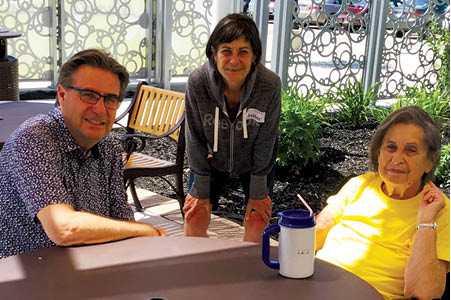 Preparing for Long Term Care
Preparing for Long Term Care
Last summer, Jan Winter’s elderly mother, Vicky – who lived in her own home – was beginning to show signs of dementia, but was still well enough to make regular visits to the cottage with Jan.
Summer 2020 was a different story. Earlier this year, Jan could see that her mother was experiencing paranoia and hallucinations. She reached out for information and tips from the Alzheimer Society about how to respond, which helped her family to cope.
Then COVID-19 struck, and with recommendations for physical distancing in place, the family felt they couldn’t go to visit Vicky. They’d talk to her often on the phone, but Jan says, “We could hear the confusion in her voice.”
After four weeks apart, the family made the desperate decision to see Vicky in person. For a time, in-person visits seemed to help, but by late May, Vicky was hospitalized.
During this difficult time, Jan was in touch via phone and email with Alzheimer Society staff members, from whom she received advice on strategies for communicating with her mom, community resources, and housing and long term care options.
Vicky is now awaiting placement in a personal care home. With protocols becoming more flexible at this stage of the pandemic, it is hoped that people in Jan’s circumstances will be able to maintain better contact with their family member in care and help to support the transition to long term care.
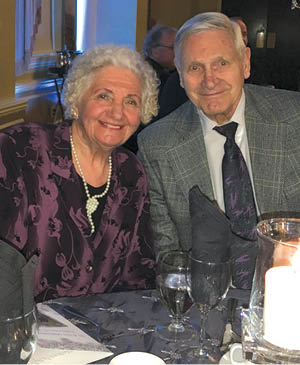 Supporting Parents in Their Home
Supporting Parents in Their Home
Audrey Dragojevic is committed to supporting her elderly parents so they can stay in their own home. In the midst of a pandemic, however, that has been a difficult endeavour.
Audrey’s father, Gunter, has dementia. Her mother, Rosemarie, needs help with shopping and paying bills, and she can’t cope alone. After three weeks of trying to support them over the phone during the early days of the pandemic, it became critical that Audrey go in person to help them out.
Even so, the social isolation took a toll on the couple, and it still is. While they used to socialize, now their only interaction is with the TV and each other. “They don’t go out and they’re getting very confused by what’s on the news,” Audrey says. She explains the situation, but two days later, she has to explain it all again.
The lack of stimulation also means her father is sleeping more during the day, causing him to wake in the night, disturbing Rosemarie. It becomes a vicious cycle.
Audrey connected with the Alzheimer Society through its First Link® program, and staff members provided her with verbal help and resources via email. Client Support Coordinator Sarah Dueck says, “We support Audrey so she is equipped to assist her parents in their home.”
Teepa Snow is Live at Care4u 2020!
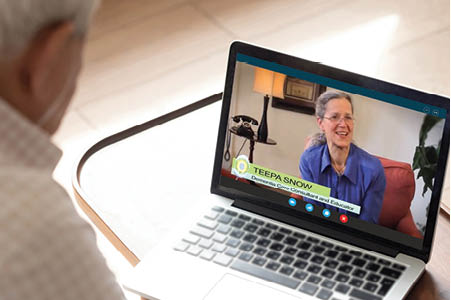 The Alzheimer Society of Manitoba’s Care4u Family conference is a go-to experience for many family members and friends of people with dementia. This year’s shorter, virtual conference is packed with interesting and important information focusing on practical, day-to-day strategies and tips that caregivers can put to immediate use.
The Alzheimer Society of Manitoba’s Care4u Family conference is a go-to experience for many family members and friends of people with dementia. This year’s shorter, virtual conference is packed with interesting and important information focusing on practical, day-to-day strategies and tips that caregivers can put to immediate use.
The Society is thrilled to announce that world-renowned dementia care expert Teepa Snow will bring her dynamic speaking skills and humour to the conference, which takes place on Saturday, October 24 from 9 am to 12 pm. Those who are familiar with Teepa will be excited to know that she is presenting live sessions, as well as a dedicated Q and A, where she will answer pre-submitted questions. Details to submit questions for Teepa will be available upon registration.
This is a rare opportunity to engage with and learn from Teepa – all from the comfort of home! She will lead participants through discussions of some timely and significant topics, including how to improve hands-on care giving skills, ways to respond to a person with dementia who is experiencing emotional distress, and practical tips for getting through the day. With registration to Care4u, Teepa’s sessions can be accessed for one year.
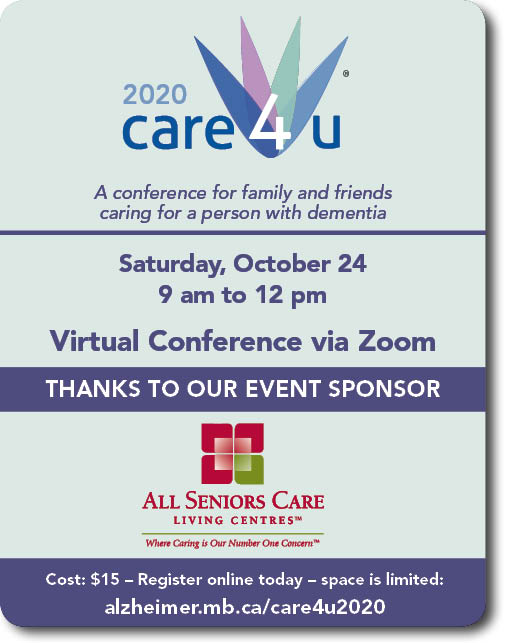 Participants will also hear from Dr. Barry Campbell, a geriatric psychiatrist and local dementia care expert. Dr. Campbell has years of clinical expertise working with families and has engaged with both Winnipeg and regional health authorities on policy changes, education and clinical practice. He is adept at identifying the emerging needs of individuals with dementia and their caregivers.
Participants will also hear from Dr. Barry Campbell, a geriatric psychiatrist and local dementia care expert. Dr. Campbell has years of clinical expertise working with families and has engaged with both Winnipeg and regional health authorities on policy changes, education and clinical practice. He is adept at identifying the emerging needs of individuals with dementia and their caregivers.
Dr. Campbell will offer his knowledge on how family members can communicate around sensitive issues that arise during the course of the disease, including obtaining a diagnosis, driving safely, receiving home care support and moving to long term care. He will also discuss advocacy in long term care, a relevant area that warrants open and honest conversations – with or without a pandemic situation.
To register for the Care4u 2020 Conference or for more information, go to alzheimer.mb.ca/care4u2020 or call 204-943-6622 in Winnipeg or 1-800-378-6699.
CEO Message: A Conversation About Long Term Care

Many families struggle with the decision about where and when to make the move to long term care. Through conversations with them, we know that encountering this crossroad, and the choices that go with it, is one of the most difficult points in their journey with dementia.
The COVID-19 pandemic has brought further challenges to families in this position. Sadly, we have not been spared the outbreaks in long term care facilities happening in other parts of Canada with several declared in Manitoba. We’ve talked to many people with relatives in long term care who remain anxious. For months, they were unable to visit face-to-face, and no matter how hard a facility may have tried, communication between residents and their family members was difficult.
Families have been left with heightened feelings of concern. While they appreciate that physical distancing efforts are in place to limit the spread of the disease, many have worries about the effects of isolation on their relatives.
Nationally, this pandemic has exposed a crisis in long term care delivery across the country. This is especially pertinent for those families impacted by dementia, as 70% of long-term care residents have some form of the disease.
It is imperative that families be able to count on long term care to deliver on their promise of good quality care. Families affected by dementia are asking us to lead conversations with our provincial and federal leaders about enhancing funding, resources and care home staff training so that an improved quality of life for people living in long term care will result. We welcome the conversations that will lead to solutions.
Personal care homes are an important part of the continuum of care. We will use our voice to ask governments to ensure that they are designed, resourced and supported in a way that allows consistently delivered, best practice quality of care throughout the province.
People with dementia and their families deserve nothing less.
Working to Find the Cause:
Manitoba Researcher Receives Funding for Promising Study

Growing up in Mumbai, India, Chetan Patil was fascinated with the workings of the brain. He learned how memories are formed and how neurons come into play to create them. As he got older, he wondered why the brain sometimes starts destroying those memories.
Today, Chetan is working on his PhD in the Neuroscience Research Program at the University of Manitoba under the supervision of Dr. Michael F. Jackson. He is researching a way to prevent memory loss.
Chetan’s research has earned him a Discovery Doctoral Award from the 2020 Alzheimer Society Research Program (ASRP). The only national funding agency dedicated to Alzheimer’s research, the ASRP supports the next generation of Alzheimer’s researchers in Canada, like Chetan, and provides reason to hope that new discoveries in dementia research will continue.
In his work, Chetan is studying the relationship between pannexin1 channels in the brain and amyloid beta, a brain
protein that can build up over more than a decade and cause the destruction of brain cells, leading to Alzheimer’s disease. Researchers have been aware of the presence of amyloid beta in the brains of persons with Alzheimer’s for more than a century.
He explains that pannexin1 channels are present on the neurons in the brain, and they act like doors, which are usually closed. If they open, a signal is relayed to the immune cells – the defence force of the brain – which then interact with the neurons, leading to their eventual loss from the brain.
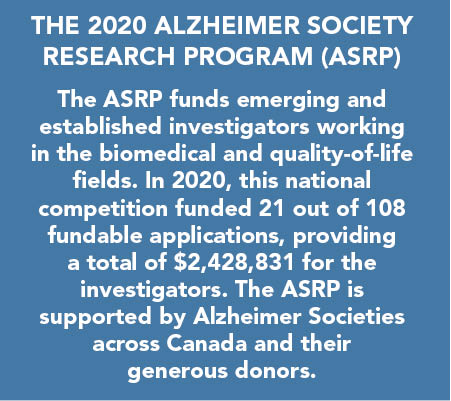 “We think what is happening in Alzheimer’s disease is that the accumulation of amyloid beta causes the pannexin1 channel ‘door’ to always be open, leading to the death of neurons. So, the amyloid beta is the bad guy, and it uses pannexin1 to do its dirty work.”
“We think what is happening in Alzheimer’s disease is that the accumulation of amyloid beta causes the pannexin1 channel ‘door’ to always be open, leading to the death of neurons. So, the amyloid beta is the bad guy, and it uses pannexin1 to do its dirty work.”
His research may show that a novel peptide he has developed could inhibit the harmful functions of pannexin1 channels and prevent the death of neurons caused by amyloid beta. If his research is successful, it could delay or even prevent the progression of Alzheimer’s disease.
“We’re trying to understand what goes wrong in that initial stage and if we can stop it, we could halt the disease forever,” he says. ”
Posthumous Gift Honours Wife of 70+ Years
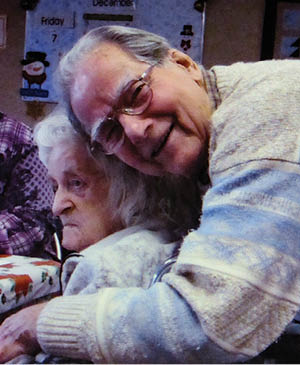
When Fred and Dot Jensen celebrated their 70th wedding anniversary in June 2017, it was a bittersweet occasion. Dot, who had Alzheimer’s disease, was in a personal care home and not doing well.
“It was a milestone but not much of a celebration,” Cindy Litke, their only child, recalls.
The couple’s 60th anniversary was happier, but also the start of a difficult journey. The first hint of Dot’s dementia came during that event – she didn’t recognize some of the family who attended the party.
Cindy’s dad cared for his wife for three years in their St. Vital home until a fall forced a reluctant Fred to arrange to move Dot to a personal care home in 2011.
At that point Fred started attending one of the Alzheimer Society’s support groups. “He talked about how much he enjoyed discussing the trials and tribulations with others who were going through the same thing,” says Cindy.
In March 2018, Dot passed away. Two years later, on February 4, 2020 – just a few weeks short of his 92 birthday – Fred lost his battle with advanced prostate cancer. He had continued to live a full and independent life until a few months before his death.
Reminiscing about family life, Cindy recalls a wonderful childhood and remembers many happy years when her parents pursued various interests, especially curling and golf. Dot loved trying new things; when she took up pottery, Fred built her a pottery wheel. They enjoyed summers at the lake, attending their grandson’s sports activities and spending time with friends.
Fred progressed from small engine repairman to vocational teacher, working on his teaching degree when he was in his forties. He retired after many years as a welding and machine shop instructor at Lord Selkirk Regional Comprehensive School.
“He was one of a kind,” says his daughter, recalling how easily he slipped into the role of homemaker once Dot was no longer able to take care of the home. “He was very self-sufficient right to the end.”
Fred was known for his generous spirit and had supported many local organizations in his lifetime. Still, says Cindy, “It was interesting that he suffered from prostate cancer yet chose to give his most substantial bequest to the Alzheimer Society of Manitoba.” She knew it was her father’s way of honouring the woman to whom he had committed his life. ”
Online Fall Education and Support via Zoom:
We are Here for You!
 The Alzheimer Society of Manitoba is holding a variety of virtual education sessions and care partner support groups during the fall months.
The Alzheimer Society of Manitoba is holding a variety of virtual education sessions and care partner support groups during the fall months.
The fall family education series offers a range of topics that will help people with dementia and their caregivers plan ahead and become more confident on their dementia journey. Click here for upcoming sessions and to register online today.
We are also currently offering virtual caregiver support groups to help connect people with others living in a similar situation during these uncertain times and to ensure that families continue to have access to support and information. Click here for upcoming dates and details on how to register.
Our offices are open for one-on-one appointments. You can also reach a comforting ear by phone or get a quick response by email. Call us at 204-942-6622 (Winnipeg) or at 1-800-378-6699 (toll free). Check out our website at alzheimer.mb.ca
Dementia Friendly Community Programs:
Get Ready to Participate Virtually and In Person

A diagnosis of dementia shouldn’t mean that daily activities must come to a standstill.
To help people feel as comfortable participating in activities after their diagnosis as they were before, the Alzheimer Society of Manitoba collaborates with local organizations to offer a variety of engaging programs tailored to people with dementia and their care partners.
The Society is excited to announce that a new in-person program offered through the Assiniboine Park Zoo will be piloted this fall. Called Journey Through the Zoo, this program will be available on Tuesdays from September 29 to October 20 from 10 am to 12 noon.
The popular Minds in Motion® program, which promotes physical, social and brain challenging activities for people with dementia and their care partners, will be available virtually through the Society. As well, partnered sites are working towards offering physically distanced in-person sessions when it’s safe to do so.
Those who have been missing these programs during the pandemic, and new participants who want to become involved, are encouraged to check for registration details, dates and times, which will be posted as they become available, at alzheimer.mb.ca
“Families can experience a lot of change following a diagnosis of dementia, but if interests and hobbies can be continued, people’s lives will be more fulfilling,” says Erin Crawford, the Society’s Program Director.
Click here for details on upcoming community programs.
Trivia Challenge: Save the Date!

Exercise your brain and join the Alzheimer Society for our 12th annual Trivia Challenge!
The new virtual event will take place on Tuesday, October 13th at 7 pm.
Gather your friends, family and co-workers for a fun night of trivia!
Click here for more information and to register online today!
The Winnipeg 10 & 10 Run is going Virtual!

Run or Walk 5 km, 10 km, 10 miles or 30 km, anytime and anywhere, between September 13 and 28, 2020.
Register online today at events.runningroom.com
Virtual Entry – $40 includes a finishers medal and a technical long sleeve t-shirt. Five dollars of each registration fee goes to the Alzheimer Society of Manitoba.
Contact Information
For more information please contact Chris Walton.
